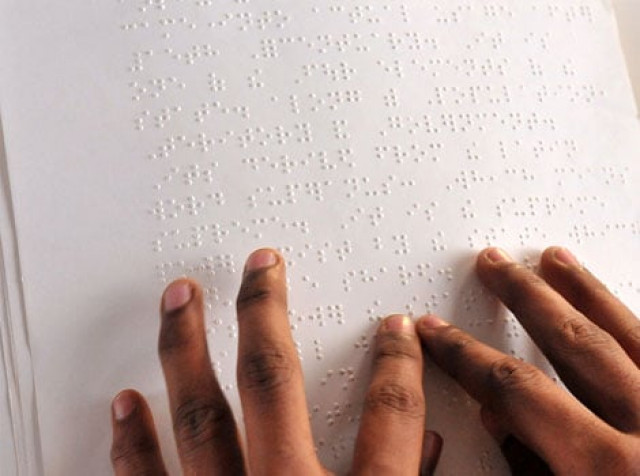Handicapped students: HEC’s lack of policy hampering educational pursuits
Most universities in the country have zero measures to assist disabled students.

The HEC does not have any figures on how many disabled students are enrolled all over the country. PHOTO: AFP
Regardless of the quality of education or the size of campuses, almost all universities in Pakistan are inaccessible for disabled students. Even the prospectuses and admission forms of varsities do not mention any details or provide guidelines for the physically challenged in this regard.
Disabled students in various universities have to struggle to move around the campus with the help of their peers as there is no standard operating procedure at the universities, nor has any disability-friendly policy been formulated by the Higher Education Commission (HEC).
A student of mass communication at the National University of Sciences and Technology said she cannot appear in the written tests or examinations because of vision problems.

According to the department staff, she submitted a medical report with the examination branch and was told to write an application to the head of department as well. She did so, but the issue has yet to be resolved. Students like her are forced to knock on countless doors looking for attention which should already be given to them, considering their special needs.
Neither the HEC nor any other government or private body has figures as to the number of students with visual, hearing and other physical impairments.

Among the various types of handicapped students, visually-impaired ones have the most problems as they are unable to access academic libraries.
It might be understandable if this was the case in a handful of universities, but the problem is universal --- those with special needs are not welcome.
Universities fail to display vital information such as accessible accommodation and guides for wheelchair users on how to navigate through the campus.
Physically-disabled students do not desire top-notch special facilities for themselves, but only the basics for getting educated --- physical access to buildings, libraries and conference halls. But no university provides proper ramps, exclusive or public space for the disabled and buildings are not constructed in light of the needs of disabled students.
Bilal Niaz, a former student of the National University of Modern Languages (NUML), moved around the campus in his wheelchair with the help of his friends but did not receive any assistance from the university.
“I had a serious problem and the only thing the university department did for me was changing the lecture room from the second to the ground floor,” he said.

He further added that it was not sufficient as going to the library or the administration block was a tough job and he would always have to require assistance of friends.
Inaccessibility of buildings has been the most serious barrier for disabled students as it makes them dependant on others.
It seems that the majority of buildings and libraries in universities have been constructed to virtually prevent handicapped students from entering them.
Moreover, where they can actually get inside, the interior layouts are often done in ways that barely offer them any freedom to move. Going from one floor to another is a distant dream. Due to this gross, a large portion of students in every university are deprived of a proper education.
When contacted, HEC officials were unsure about any policy or directions that bounds universities to assist and cooperate with such students on a preferential basis.
The Express Tribune was informed that in 2008, following a meeting between the HEC and architects, a letter was circulated at HEC-approved universities to ensure ramps, railings, special washrooms and other necessities are available to assist students with various disabilities. But the universities either did not receive the letter, or just did not pay heed to it.
“There is a dire need to address this issue,” said Attia Zulfiqar, a teacher at the NUML Mass Communication department.
Published in The Express Tribune, October 21st, 2013.



1724319076-0/Untitled-design-(5)1724319076-0-208x130.webp)















COMMENTS
Comments are moderated and generally will be posted if they are on-topic and not abusive.
For more information, please see our Comments FAQ